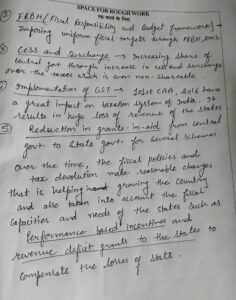The Indian Constitution provides provisions for emergency powers that can be invoked in times of crisis. These provisions are outlined in Part XVIII, Articles 352 to 360, and are aimed at ensuring the integrity, security, and smooth functioning of the nation during extraordinary situations. Let's taRead more
The Indian Constitution provides provisions for emergency powers that can be invoked in times of crisis. These provisions are outlined in Part XVIII, Articles 352 to 360, and are aimed at ensuring the integrity, security, and smooth functioning of the nation during extraordinary situations. Let’s take a closer look at these emergency provisions and the debates surrounding their scope and limits, as well as the role of the judiciary in overseeing their exercise.
Provisions for Emergency Powers:
a. Article 352 – National Emergency: This provision allows the President of India to declare a national emergency in situations of war, external aggression, or armed rebellion. It grants the central government sweeping powers to take necessary steps to address the emergency situation effectively.
b. Article 356 – President’s Rule: This provision empowers the President to impose President’s Rule in a state if the constitutional machinery in that state fails or is unable to function properly.
c. Article 360 – Financial Emergency: This provision enables the President to proclaim a financial emergency if the financial stability or credit of the nation or any part thereof is threatened. It grants the central government authority to take necessary financial measures to address the crisis.
Scope and Limits:
The provisions for emergency powers have been a subject of intense debate and scrutiny. Critics argue that these provisions have the potential for misuse and can infringe upon individual rights and democratic principles. There have been concerns about the subjective interpretation of “internal disturbance” and the potential for political motives to influence the invocation of emergency powers.
To address these concerns, the Constitution imposes certain checks and balances on emergency powers. For example:
a. The President’s proclamation of emergency requires the approval of the Parliament within a specified time.
b. The judiciary has the power to review the validity of emergency proclamations and actions taken during emergencies.
Role of the Judiciary:
The judiciary plays a crucial role in overseeing the exercise of emergency powers in India. It acts as a guardian of fundamental rights and ensures that emergency measures do not violate the basic structure of the Constitution. The Supreme Court of India has established certain principles and guidelines to limit the scope of emergency powers, safeguard individual liberties, and prevent abuse of emergency provisions.
The landmark case of ADM Jabalpur v. Shivkant Shukla (also known as the Habeas Corpus case) during the Emergency (1975-1977) is an important example. The Supreme Court, in a controversial decision, held that during an emergency, individuals’ right to approach the courts for habeas corpus relief stood suspended. This decision sparked significant debates and criticism, emphasizing the need for a robust and vigilant judiciary to protect constitutional rights during emergencies.
Over the years, the judiciary’s role in overseeing emergency powers has evolved, with courts taking a proactive stance in safeguarding fundamental rights. They have emphasized the importance of judicial review, ensuring that emergency powers are exercised within the confines of the Constitution and that individual rights are not unduly curtailed.
In conclusion, the Indian Constitution provides provisions for emergency powers, but their scope and limits have been a subject of debate. The judiciary plays a vital role in overseeing the exercise of these powers, ensuring their constitutionality and protecting individual rights. The evolving jurisprudence surrounding emergency powers reflects the delicate balance between maintaining order and upholding democratic principles in times of crisis.
See less


The reservation system in India is a form of affirmative action designed to improve the educational and employment opportunities for historically disadvantaged groups, such as Scheduled Castes (SC), Scheduled Tribes (ST), and Other Backward Classes (OBC). While the system has helped many individualsRead more
The reservation system in India is a form of affirmative action designed to improve the educational and employment opportunities for historically disadvantaged groups, such as Scheduled Castes (SC), Scheduled Tribes (ST), and Other Backward Classes (OBC). While the system has helped many individuals from marginalized communities gain access to education and jobs, it has also sparked debates. Some argue that it is essential for social equity and upliftment, while others believe it may compromise merit and efficiency. Additionally, there are discussions about whether economic criteria should also be considered for reservations.
The fairness of the reservation system in India is a topic of significant debate. Here some key points from both perspective:
Argument for the reservation system:
Argument against the reservation system:
My concerns are that the deserving aspirants who sacrifice their every privilege to give all they have for their dream profession faces rejections because of the reservation system, this is an extreme loophole we must say. Although The introduction of reservations for Economically Weaker Sections (EWS) in 2019 aimed to address some of these concerns by including economic criteria.
See less